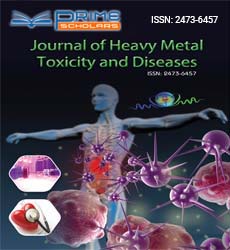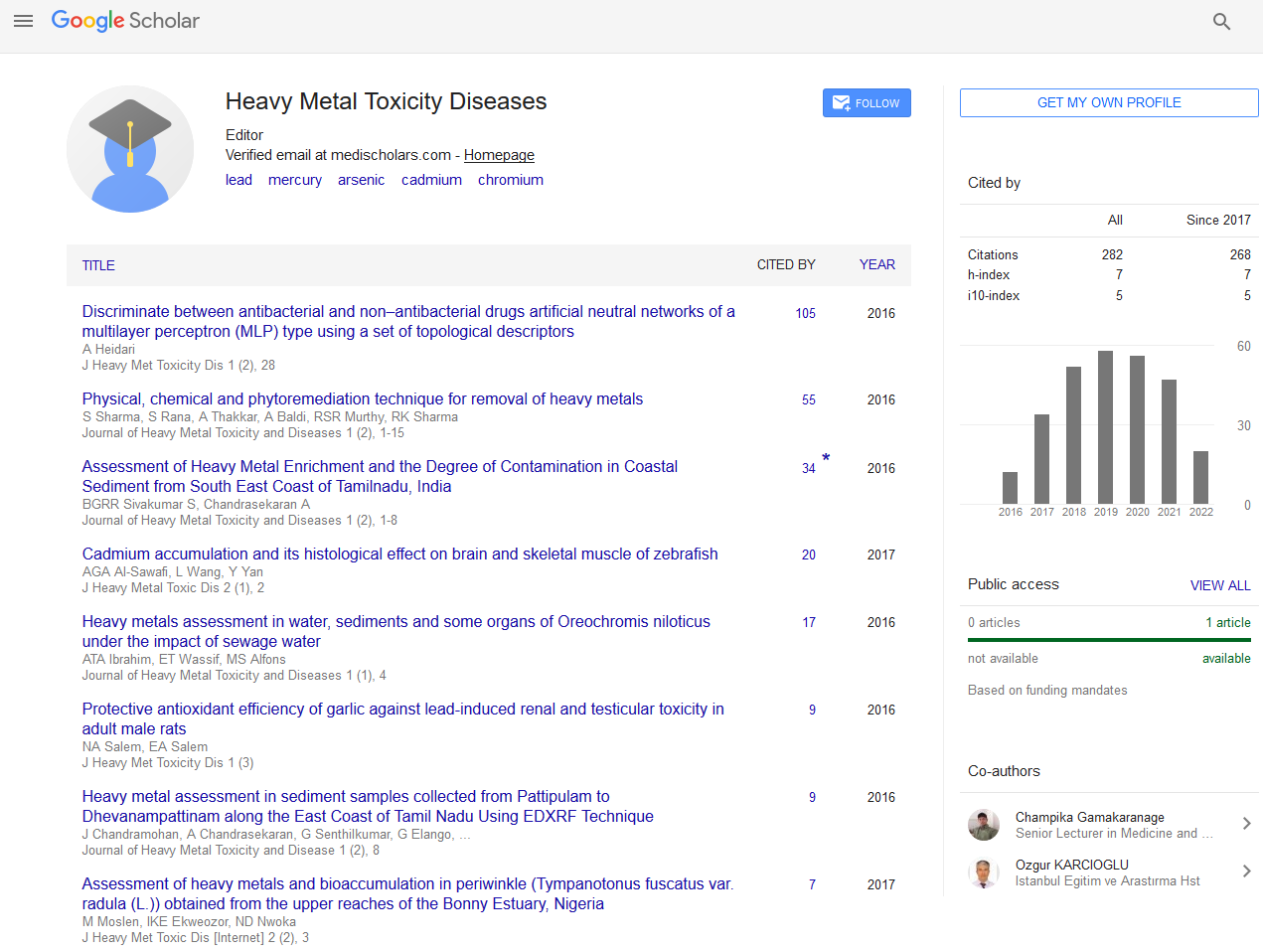Perspective - (2023) Volume 8, Issue 5
Reversing the Effects of Heavy Metal Poisoning: A Comprehensive Approach
Arif Rabi*
Department of Nutrition, Noakhali University, Bangladesh
*Correspondence:
Arif Rabi,
Department of Nutrition, Noakhali University,
Bangladesh,
Email:
Received: 30-Aug-2023, Manuscript No. ipjhmct-23-18539;
Editor assigned: 01-Sep-2023, Pre QC No. ipjhmct-23-18539 (PQ);
Reviewed: 15-Sep-2023, QC No. ipjhmct-23-18539;
Revised: 20-Sep-2023, Manuscript No. ipjhmct-23-18539 (R);
Published:
27-Sep-2023, DOI: 10.21767/2473-6457.23.5.44
Introduction
Heavy metal poisoning poses a significant threat to human
health, as exposure to metals such as lead, mercury, cadmium,
and arsenic can lead to severe and potentially irreversible health
consequences. The detrimental effects of heavy metal poisoning
on various organ systems highlight the urgent need for effective
intervention strategies. In this article, we will explore the mechanisms
of heavy metal toxicity and discuss potential approaches
for reversing its adverse effects.
Description
Heavy metals disrupt normal cellular functions by interfering with
essential biochemical processes. For example, lead can mimic
calcium and interfere with nerve signal transmission, while mercury
can impair the function of enzymes involved in cellular respiration.
Chronic exposure to heavy metals can result in a range
of health problems, including neurological disorders, kidney
damage, cardiovascular issues, and developmental abnormalities,
particularly in children. Chelation therapy is a well-established
medical intervention for heavy metal poisoning. Chelating
agents, such as dimercaprol, EDTA (ethylenediaminetetraacetic
acid), and DMSA (dimercaptosuccinic acid), bind to heavy metals
in the bloodstream and facilitate their excretion through urine.
This process helps reduce the metal burden in the body and mitigates
further damage to organs. Adequate nutrition plays a crucial
role in supporting the body’s natural detoxification processes.
Certain nutrients, such as antioxidants (e.g., vitamins C and
E), selenium, and zinc, can help neutralize the harmful effects of
heavy metals. Additionally, a well-balanced diet rich in essential
nutrients promotes overall health and strengthens the immune
system, aiding in recovery. The liver is a key organ involved in
detoxification. Supporting liver function is vital for individuals
recovering from heavy metal poisoning. Milk thistle, N-acetylcysteine
(NAC), and turmeric are examples of natural compounds
known for their hepatoprotective properties. These substances
assist in liver regeneration and enhance the organ’s ability to metabolize
and eliminate toxins. Increasing fluid intake and promoting
diuresis (urine production) are essential for expelling heavy
metals from the body. Adequate hydration enhances the kidneys’
ability to filter and excrete toxins. Diuretic foods and herbs, such
as celery, parsley, and dandelion, can complement hydration efforts
by promoting urine flow. Identifying and eliminating the
source of heavy metal exposure is crucial for long-term recovery.
This may involve changes in occupation, dietary habits, and
lifestyle choices. Individuals should be educated on ways to minimize
exposure, such as using protective gear in occupational settings,
consuming clean and organically sourced foods, and avoiding
contaminated water sources. Certain supplements, such as
alpha-lipoic acid (ALA) and glutathione, have shown promise in
supporting the body’s detoxification pathways. ALA, in particular,
has been studied for its ability to chelate heavy metals and
reduce oxidative stress. However, it is essential to consult with a
healthcare professional before incorporating such supplements
into a treatment plan.
Conclusion
Reversing the effects of heavy metal poisoning requires a multidimensional
approach that combines medical interventions,
nutritional support, and lifestyle modifications. Chelation therapy,
nutritional supplements, liver support, hydration, and behavioral
changes collectively contribute to the restoration of health
in individuals affected by heavy metal toxicity. Early detection,
prompt intervention, and ongoing monitoring are crucial aspects
of managing heavy metal poisoning and mitigating its long-term
consequences.
Citation: Rabi A (2023) Reversing the Effects of Heavy Metal Poisoning: A Comprehensive Approach. J Heavy Met Toxicity Dis.
08:44.
Copyright: © 2023 Rabi A. This is an open-access article distributed under the terms of the Creative Commons Attribution License, which permits unrestricted use, distribution, and reproduction in any medium, provided the original author and source
are credited.

